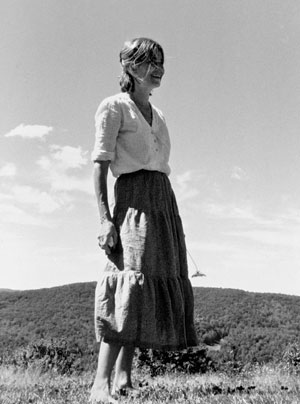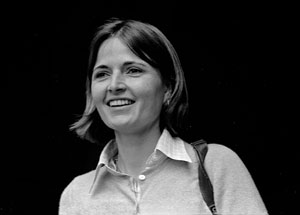About Petra
"The problems I see in America are fundamentally the problems of a mass democracy in which people have lost the feeling that they can influence the government and in which there's so much social and racial conflict—economic and political conflict—that it is very difficult to make the old mechanisms work. Still, I believe that if we put our politics to the test of our ideals and values, which we so clearly spell out in the Constitution and the Bill of Rights, there would be progress, and that is what we should struggle for."
—Petra Shattuck, December 1973
Petra Tölle Shattuck was no stranger to hard times. Born in Saarbrucken, Germany, during World War II, she had early memories of bombings by American planes, dead and dying civilians in railroad stations, and desperate displaced persons camped near the farm where she and her sisters dug potatoes by hand. Petra took refuge from Germany’s harsh realities in Karl May’s novels about Native American heroes, whose struggles she would later embrace as her own.
As Petra grew older, she came to realize that the horrors that her family and neighbors had suffered were, in some ways, a consequence of the support they gave to a political party that had promised to restore order and pride to their country after its defeat in World War I but had instead initiated a second World War and systematically murdered millions in the name of racial purity. This realization gave Petra a deep appreciation of the consequences of political choices.
As a teenager, she ventured to make a new life for herself in the United States. Beginning as an au pair for a family in Connecticut, she won scholarships and went on to earn a B.A. from Pomona College in 1964 and a Ph.D. from Columbia University in 1972.
While working on her doctorate, Petra taught politics and civil liberties at the John Jay College of Criminal Justice at the City University of New York. Among her students were many recent immigrants. Most were the first in their families to attend college. A dedicated mentor, Petra persuaded many struggling students to stay the course and get advanced degrees. She especially enjoyed teaching policemen and street kids together in the squad room of a Harlem police station, where she used constitutional debates not just to raise fundamental issues of law and justice, but also to inspire mutual understanding.
Petra’s values were private as well as public. During the anti-war protests of the 1960s, she met and married John Shattuck, who began his career as an attorney for the American Civil Liberties Union, first in New York City and later in Washington, D.C. She gave birth to Jessica, Rebecca and Peter. She combed thrift stores for broken things to restore and make beautiful and created a prize-winning costume for one of her children from scraps of cloth. She baked blueberry tortes and laid bricks for a backyard patio. The Shattucks’ home, and Petra’s kitchen table, became a gathering place for lawyers and activists who were challenging the abuses of power during the Watergate era.
While raising her family, Petra continued teaching and became a respected scholar on a wide range of subjects, including comparative criminal justice, the rights of Native Americans and the regulation of nuclear power plants. But Petra was not content just to write about human rights. Convinced that the law was a tool she needed to enable the disenfranchised to control their own destiny, she enrolled at Georgetown Law School and went on to get her law degree from Boston University, where she was an editor of the law review and taught at the Harvard Extension School.
Despite her many successes as a scholar and teacher, Petra drew strength from her perspective as an outsider. Personally and professionally, she had a special ability to reach out to those poised on the edge of accomplishment and she worked with great energy on their behalf.
After clerking for federal Judge Douglas Woodlock, she joined the Boston law firm of Palmer & Dodge. Shortly thereafter, in March 1988, Petra Shattuck was struck down by a cerebral hemorrhage. She was only 46.
In their grief at Petra’s passing, her family and friends decided to create a foundation that would recognize and support the kind of people Petra admired most—unsung heroes who, with few resources beyond their own strength, compassion and commitment, champion equality, fight for social justice and defend the rights of individuals and groups in communities across America.
 Photo by Dorothea von Haeften
Photo by Dorothea von Haeften  Photo by Dorothea von Haeften
Photo by Dorothea von Haeften